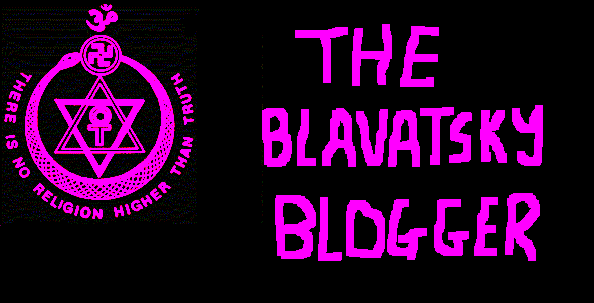Blavatsky Blogger

Taking Theosophical
ideas
into the 21st
century

The
Thunder Speaks Sanskrit
In
the concluding section of “The
Published
in 1922 T S Eliot like H P Blavatsky
says that man must go back to the Ancient
Wisdom
which predates modern formal religions.
Posted

Extract
from "What the Thunder Said", the fifth and final section of
"The
V. What
the Thunder Said
Waited for
rain, while the black clouds
Gathered
far distant, over Himavant.
The jungle
crouched, humped, in silence.
Then spoke
the thunder
DA
Datta: what have we given?
My friend,
blood shaking my heart
The awful
daring of a moment's surrender
Which an
age of prudence can never retract
By this, and
this only, we have existed
Which is
not to be found in our obituaries
Or in
memories draped by the beneficient spider
Or under
seals broken by the lean solicitor
In our
empty rooms
DA
Dayadhvam: I have heard the key
Turn in
the door once and turn once only
We think
of the key, each in his prison
Only at
nightfall, aethereal rumors
Revive for
a moment a broken Coriolanus
Damyata: the boat responded
Gaily, to
the hand expert with the sail and oar
The sea
was calm, your heart would have responded
Gaily, when
invited, beating obedient
To
controlling hands
I sat upon a
shore
Fishing,
with the arid plain behind me
Shall I at
least set my lands in order?
London
Bridge is falling down, falling down falling down
Poi s'ascose nel foco che
li affina
Quando fiam ut chelidon - O swallow swallow
Le Prince d'aquitaine
à la tour abolie
These
statements I have shored against my ruins
Why then Ile fit you. Hieronymo's mad againe.
Datta. Dayadhvam. Damyata.
Shantih shantih shantih
____________________________
These are
the concluding lines of "The
" The
Waste Land" is the story of a journey or quest that the man of the early
20th century makes through the sterility and spiritual desolation of his modern
world, until he arrives, in these final lines, at the Ganges, the sacred river,
where, eventually, he finds some answers to his existential questions.
"
The
thunder speaks Sanskrit, because Eliot goes back to the cradle of Western
civilization to
the roots and the most vital source of Western
culture. T S Eliot like H P Blavatsky is saying that man must go back to the
Ancient Wisdom which predates modern formal religions.
The
Thunder-God repeats to man the three imperatives of the Upanishad, a Hindu
sacred book:
DATTA give
DAYADHVAM co-operate,
accept the others
DAMYATA control
So the
spiritual quest of the modern wanderer, the modern knight comes to these
ancient, elementary, basic precepts of life on which to rebuild a
crumbled civilisation.
Yet, the
poem does not finish on these three imperatives. Eliot now introduces the image
of the fisher, which is reminiscent of many legends
and myths: the Fisher King, King Arthur, Christ, and which represents Manin his best specifications.
This man
wants to reorganise his life, his
kingdom, his future, saving something from the
collapse of the ideals thathe has witnessed. Of
course, he saves poetry, (Dante, Latin literature,
French
poetry, Elizabethan drama) which contains those elements of thegrowth
of the human soul that must not be lost. Probably, in this context,
the last words, "Shantih
shantih shantih",
which mean "peace" in Hindi and is sometimes translated as “The Peace
which passeth understanding” These word which conclude the Upanishad, are both a
message, a farewell and an integral part of the multi-sourced Eliot style.
______________________
The Blavatsky
Blogger
Taking Theosophical
ideas
into the 21st
century
__________________________
Postings
to this Website reflect
the views of The Blavatsky Blogger.
Please
don’t go looking for anyone else.

